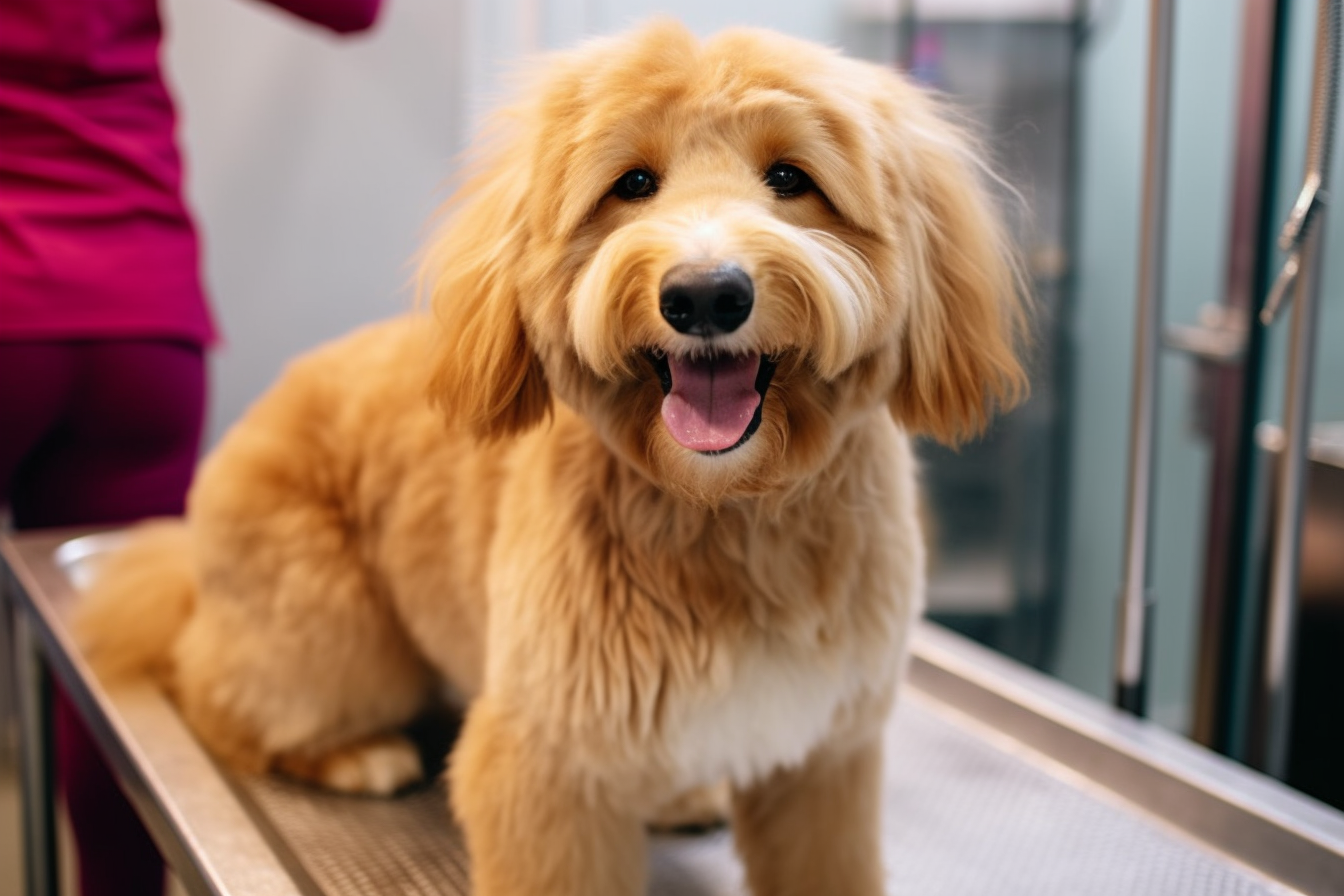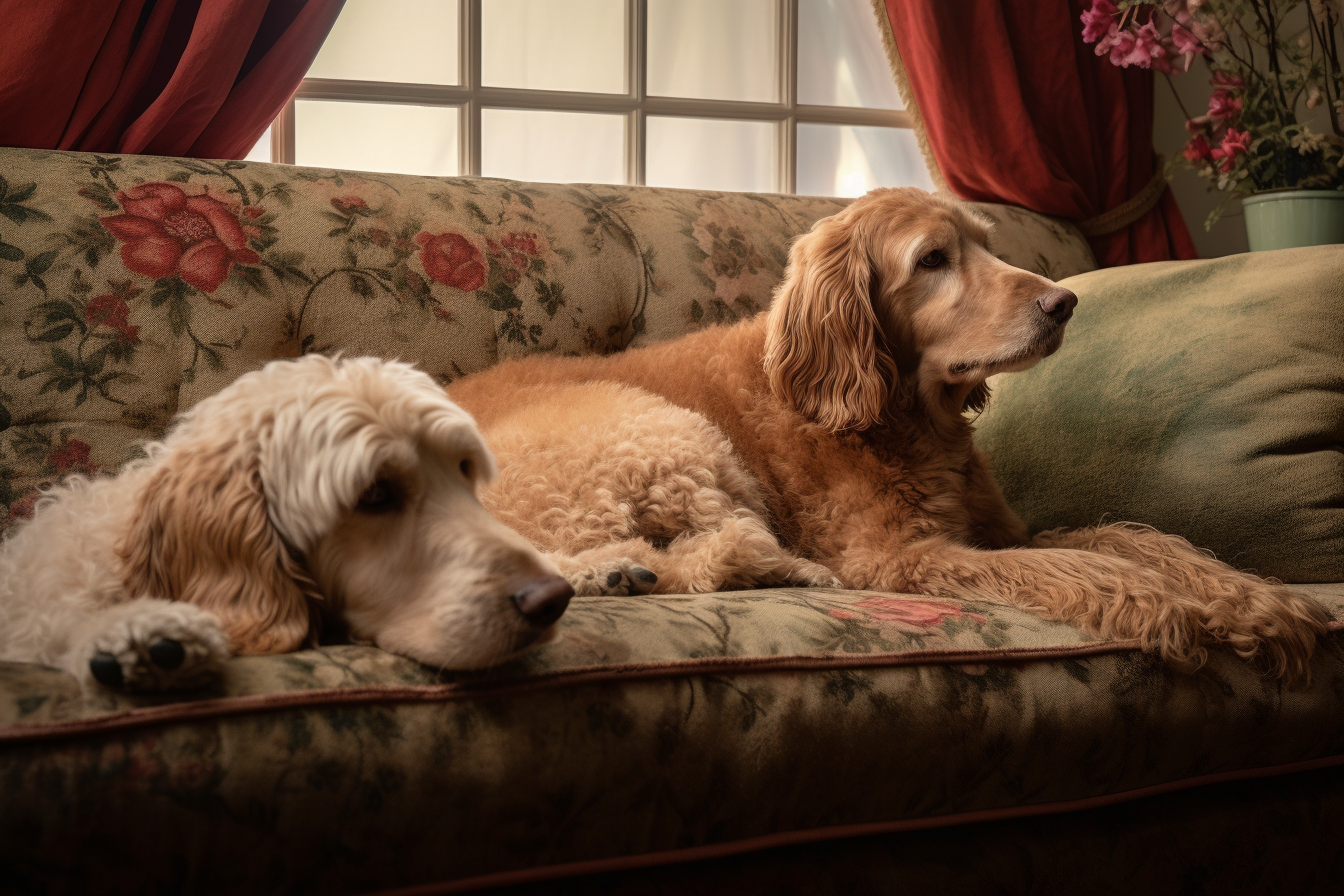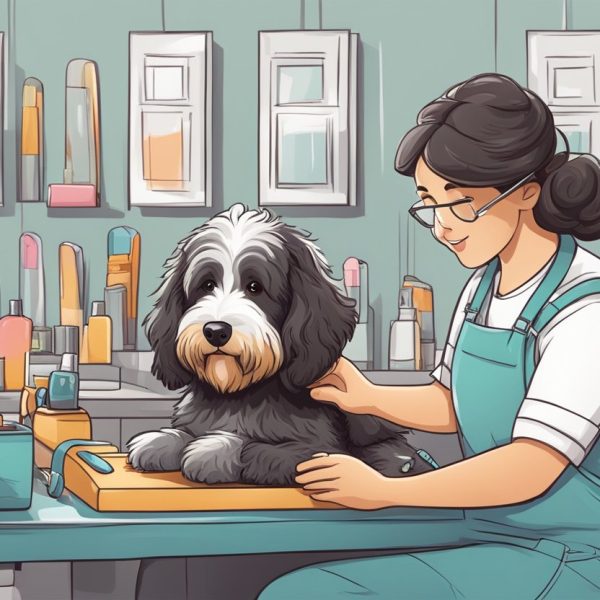Bernedoodles are a popular designer breed that is a cross between a Bernese Mountain Dog and a Poodle. While these dogs are known for their friendly and affectionate nature, they are also prone to certain health issues. As a responsible pet owner, it is important to be aware of these potential health concerns and take the necessary steps to prevent and treat them.
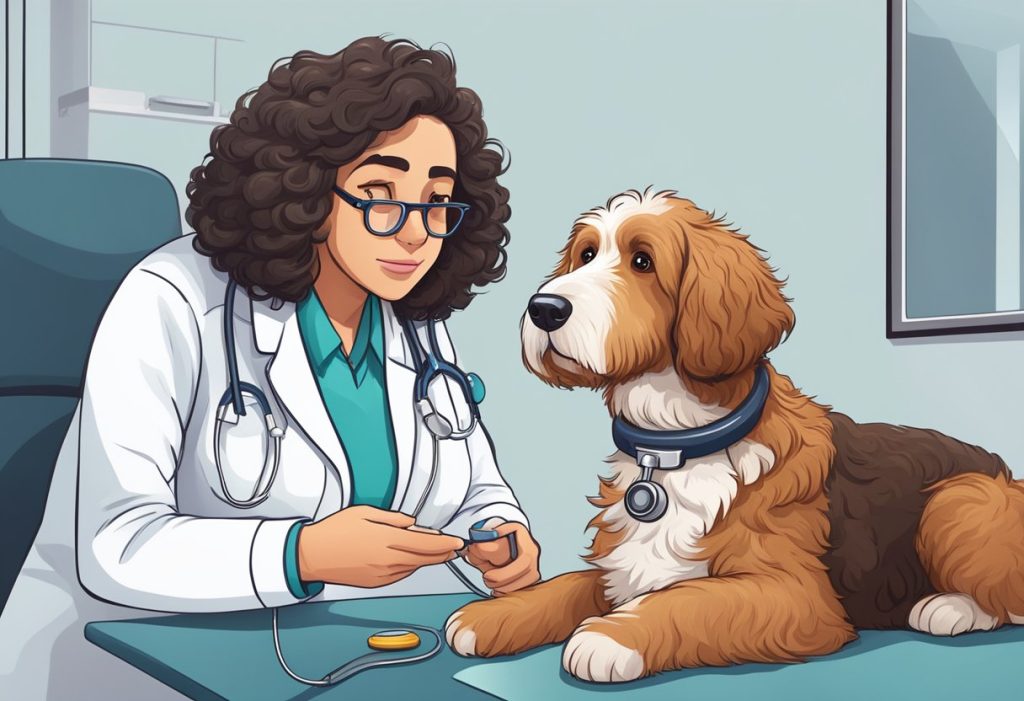
Genetic health concerns are one of the most significant issues that Bernedoodles can face. Due to their mixed breed heritage, they may inherit health problems from both parent breeds. This can include issues such as hip dysplasia, progressive retinal atrophy, and von Willebrand’s disease. Understanding these genetic health concerns can help you identify potential issues early on and take action to prevent them.
In addition to genetic health concerns, Bernedoodles may also face common health issues that affect many dogs. These can include allergies, ear infections, and dental problems. Preventive health measures, such as regular vet check-ups, a healthy diet, and exercise, can help minimize the risk of these issues. However, it is important to be aware of the signs and symptoms of common health issues so you can seek treatment promptly if necessary.
Key Takeaways
- Bernedoodles are prone to genetic health concerns due to their mixed breed heritage.
- Common health issues such as allergies and ear infections can also affect Bernedoodles.
- Preventive health measures and early identification of health issues can help ensure your Bernedoodle stays healthy and happy.
Genetic Health Concerns
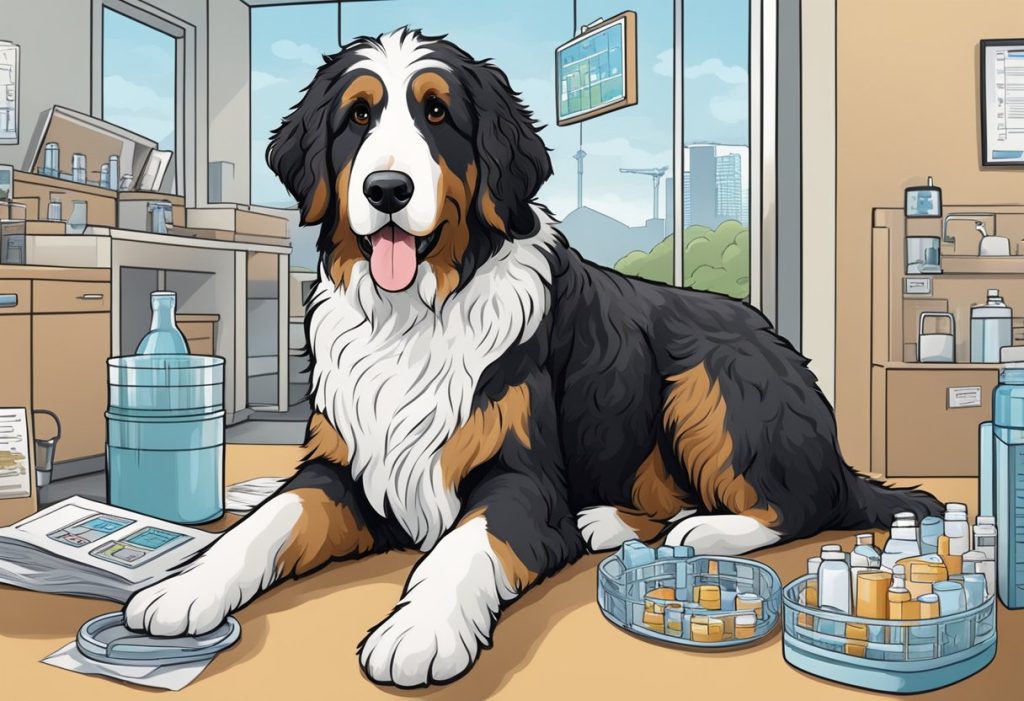

When it comes to Bernedoodles, there are a few genetic health concerns that you should be aware of. Some of the most common genetic health concerns are hip dysplasia, elbow dysplasia, Von Willebrand’s disease, and skin conditions.
Hip Dysplasia
Hip dysplasia is a common genetic health concern in Bernedoodles. It is a condition where the hip joint doesn’t develop properly, which can lead to arthritis and other joint problems. Symptoms of hip dysplasia include difficulty getting up from a lying position, limping, and decreased activity level. If you suspect that your Bernedoodle has hip dysplasia, you should take them to the vet for an evaluation.
Elbow Dysplasia
Elbow dysplasia is another genetic health concern that can affect Bernedoodles. It is a condition where the elbow joint doesn’t develop properly, which can lead to arthritis and other joint problems. Symptoms of elbow dysplasia include limping, stiffness, and decreased activity level. If you suspect that your Bernedoodle has elbow dysplasia, you should take them to the vet for an evaluation.
Von Willebrand’s Disease
Von Willebrand’s disease is a genetic health concern that affects the blood’s ability to clot. Symptoms of Von Willebrand’s disease include excessive bleeding from minor injuries, nosebleeds, and bleeding gums. If you suspect that your Bernedoodle has Von Willebrand’s disease, you should take them to the vet for an evaluation.
Skin Conditions
Bernedoodles are also prone to developing skin conditions, such as allergies and hot spots. Symptoms of skin conditions include itching, redness, and irritation. If you suspect that your Bernedoodle has a skin condition, you should take them to the vet for an evaluation.
Overall, it’s important to be aware of these genetic health concerns in Bernedoodles. By taking your Bernedoodle to the vet for regular check-ups and addressing any health concerns as soon as possible, you can help ensure that your furry friend stays healthy and happy.
Common Health Issues


As with any breed, Bernedoodles are prone to certain health issues. It’s important to be aware of these issues so that you can take the necessary steps to prevent them or catch them early on. In this section, we’ll discuss some of the most common health issues that Bernedoodles face.
Ear Infections
Bernedoodles are prone to ear infections due to their floppy ears, which can trap moisture and debris. Signs of an ear infection include redness, swelling, odor, and discharge. If left untreated, ear infections can lead to hearing loss or other complications. To prevent ear infections, it’s important to keep your Bernedoodle’s ears clean and dry. You can use a gentle ear cleaning solution and cotton balls to clean your dog’s ears once a week.
Dental Problems
Like many breeds, Bernedoodles can develop dental problems such as gum disease, tooth decay, and bad breath. To prevent dental problems, it’s important to brush your Bernedoodle’s teeth regularly with a dog-friendly toothpaste. You can also give your dog dental chews or toys to help keep their teeth clean.
Obesity
Bernedoodles are prone to obesity, which can lead to a host of health problems such as joint pain, diabetes, and heart disease. To prevent obesity, it’s important to feed your Bernedoodle a healthy diet and provide plenty of exercise. You should also avoid giving your dog table scraps or too many treats.
Allergies
Bernedoodles can develop allergies to a variety of things, including food, pollen, and dust. Signs of allergies include itching, redness, and skin irritation. To prevent allergies, it’s important to keep your Bernedoodle’s environment clean and free of allergens. You can also feed your dog a hypoallergenic diet and use allergy medications as prescribed by your vet.
Preventive Health Measures
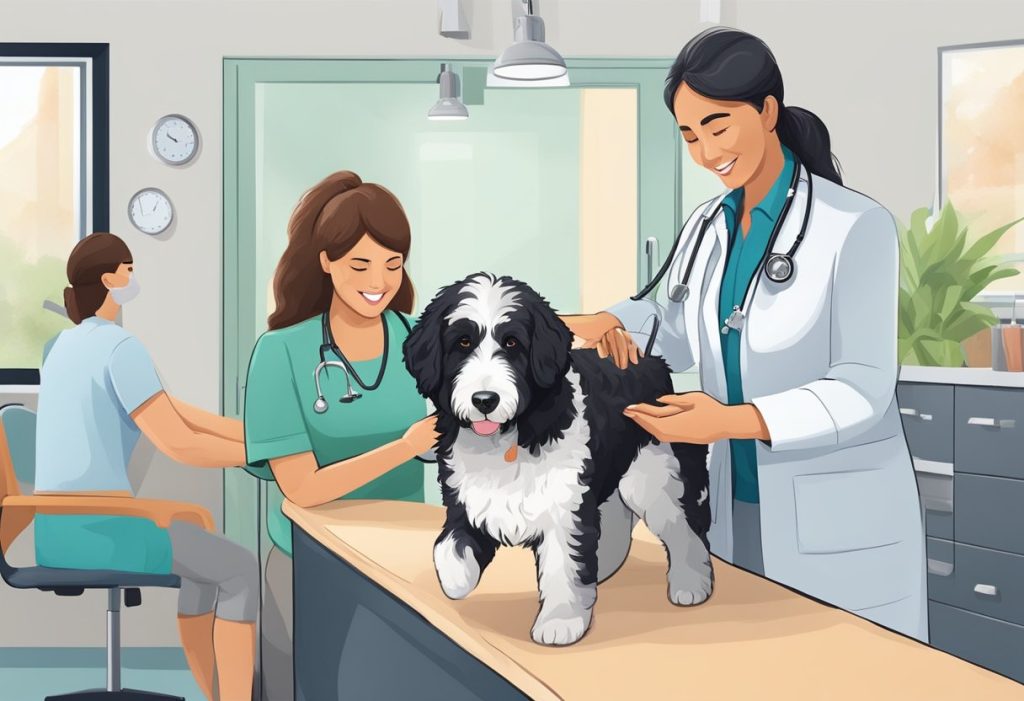

As a responsible Bernedoodle owner, it is crucial to take preventive measures to ensure your furry friend’s good health. Here are some preventive health measures that you can take:
Regular Veterinary Check-Ups
Regular veterinary check-ups are essential to maintain your Bernedoodle’s health. Your veterinarian will examine your dog’s overall health, including their weight, teeth, ears, and eyes. They will also administer vaccines and recommend preventative treatments for parasites such as fleas and ticks. Regular check-ups can help detect health issues early, which can be treated more effectively.
Appropriate Diet and Exercise
A healthy diet and regular exercise are crucial to maintaining your Bernedoodle’s health. You should feed your dog a high-quality diet that provides all the necessary nutrients. Consult with your veterinarian to determine the appropriate amount of food and feeding schedule for your dog’s age and weight. Exercise is also important to maintain a healthy weight and prevent obesity. Take your Bernedoodle for regular walks and provide them with plenty of opportunities to play and run.
Routine Grooming
Regular grooming is essential to maintain your Bernedoodle’s hygiene and prevent health issues. Brush your dog’s coat regularly to prevent matting and to distribute natural oils throughout their coat. This can also help prevent skin irritations and infections. Trim your dog’s nails regularly to prevent them from becoming too long and causing discomfort. Additionally, clean your dog’s ears and teeth regularly to prevent infections and dental issues.
Mental Stimulation
Mental stimulation is crucial to maintain your Bernedoodle’s mental health. Provide your dog with plenty of toys and activities to keep them mentally stimulated. This can include puzzle toys, interactive toys, and training exercises. Mental stimulation can help prevent destructive behavior and promote a healthy, happy dog.
By following these preventive health measures, you can help ensure your Bernedoodle lives a healthy and happy life.
Age-Related Health Concerns


As Bernedoodles age, they become more susceptible to certain health issues. Here are some common age-related health concerns you should be aware of:
Arthritis
Arthritis is a common condition that affects many dogs as they age. It is a degenerative joint disease that causes pain, stiffness, and swelling in the joints. Bernedoodles are particularly susceptible to arthritis because of their large size and weight. To help prevent arthritis, make sure your Bernedoodle maintains a healthy weight and gets plenty of exercise. If your dog does develop arthritis, your veterinarian can prescribe medication to help manage the pain.
Vision Loss
As Bernedoodles get older, they may start to experience vision loss. This can be caused by a number of factors, including cataracts, glaucoma, and retinal degeneration. If you notice your dog bumping into things or having difficulty seeing in low light, it’s important to have their eyes checked by a veterinarian. In some cases, surgery may be necessary to correct the problem.
Heart Disease
Bernedoodles are also at risk for developing heart disease as they age. This can manifest as a number of different conditions, including congestive heart failure, dilated cardiomyopathy, and arrhythmias. Signs of heart disease can include coughing, difficulty breathing, and lethargy. If you notice any of these symptoms in your Bernedoodle, it’s important to have them evaluated by a veterinarian as soon as possible.
By being aware of these age-related health concerns, you can help keep your Bernedoodle healthy and happy as they age. Regular check-ups with your veterinarian can also help catch any potential health issues early, before they become more serious.
Emergency Health Situations


As a Bernedoodle owner, it’s important to be aware of potential emergency health situations and how to handle them. In this section, we’ll discuss two common emergency situations that can arise with Bernedoodles: bloat and accidents/injuries.
Bloat
Bloat, also known as Gastric Torsion or Gastric Dilation Volvulus, is a serious and life-threatening condition that can affect Bernedoodles. This condition occurs when the stomach fills with gas, food, or fluid and then twists on itself, trapping the contents inside. This causes the pressure inside the stomach to increase, which can cut off the blood supply to the stomach and other organs.
Symptoms of bloat include restlessness, drooling, pacing, panting, and a distended abdomen. If you suspect your Bernedoodle is experiencing bloat, it’s important to seek emergency veterinary care immediately. Treatment for bloat typically involves surgery to untwist the stomach and remove any damaged tissue.
To help prevent bloat, it’s recommended to feed your Bernedoodle smaller, more frequent meals, avoid exercise immediately before or after meals, and limit access to water immediately after meals.
Accidents and Injuries
Accidents and injuries can happen to any dog, and Bernedoodles are no exception. Common injuries include cuts, scrapes, bruises, and broken bones. If your Bernedoodle is injured, it’s important to remain calm and assess the situation before taking action.
If the injury is minor, you can clean the wound with warm water and soap and apply a bandage or wrap. If the injury is more serious, such as a broken bone or deep laceration, seek emergency veterinary care immediately.
To help prevent accidents and injuries, it’s important to supervise your Bernedoodle at all times, keep hazardous objects out of reach, and provide a safe and secure environment for your dog to play and exercise.
Frequently Asked Questions
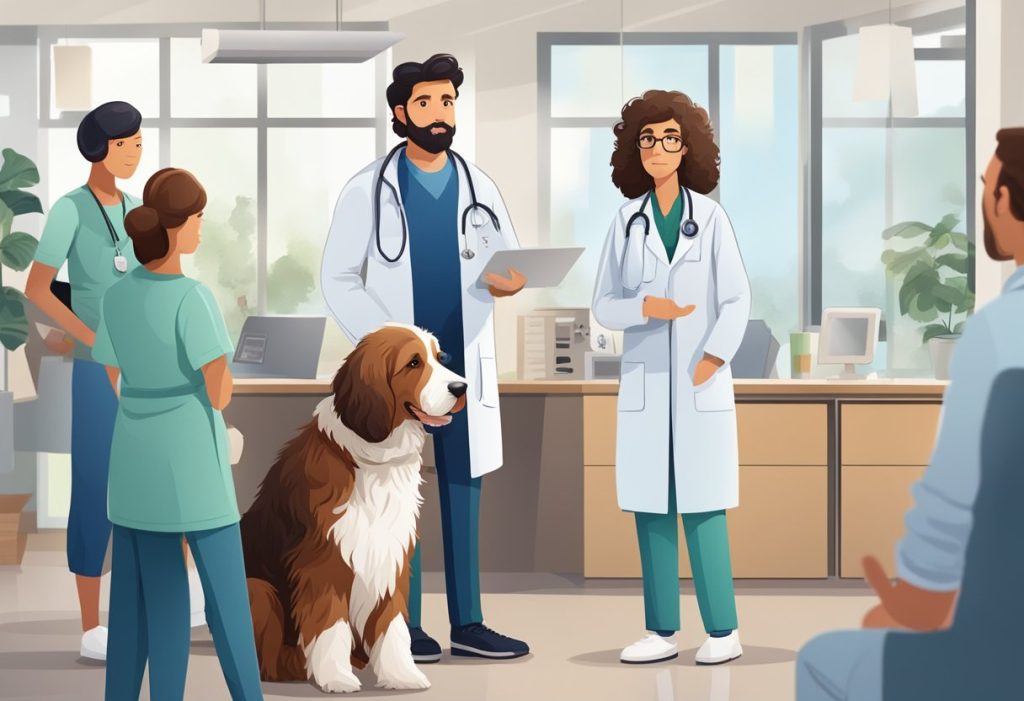

What common health problems do Bernedoodles face?
Bernedoodles can be prone to certain health issues, such as hip dysplasia, elbow dysplasia, and Von Willebrand disease, which is a blood clotting disorder. They may also experience digestive issues, allergies, and ear infections. It is important to purchase your Bernedoodle from a reputable breeder who screens their breeding stock for these conditions to help minimize the risk of these health issues.
How long do Bernedoodles typically live?
Bernedoodles typically live between 12 to 18 years, depending on their size and overall health. Smaller Bernedoodles tend to have a longer lifespan compared to larger ones.
What are the signs of digestive issues in Bernedoodles?
Some signs of digestive issues in Bernedoodles include vomiting, diarrhea, bloating, and loss of appetite. If you notice any of these symptoms, it is important to take your Bernedoodle to the vet for a check-up.
Are Bernedoodles generally considered a healthy breed?
Bernedoodles are generally considered a healthy breed, but like all dogs, they can be prone to certain health issues. It is important to take your Bernedoodle for regular check-ups and to maintain their overall health through proper exercise, nutrition, and grooming.
How do Bernedoodle health concerns compare to those of Goldendoodles?
Bernedoodles and Goldendoodles are both hybrid breeds and can be prone to similar health issues. However, Bernedoodles are more prone to hip and elbow dysplasia, while Goldendoodles are more prone to ear infections and skin allergies.
What can I do to ensure my Bernedoodle stays healthy?
To ensure your Bernedoodle stays healthy, it is important to provide them with proper nutrition, regular exercise, and grooming. Take them for regular check-ups with the vet and keep up with any necessary vaccinations. Be sure to also monitor their behavior and overall health, and address any health concerns promptly.





